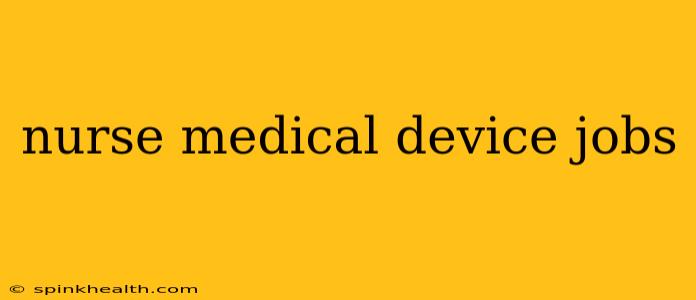The whirring of a sophisticated dialysis machine, the gentle hum of a pace-maker, the precise click of a robotic surgical assistant – these are the sounds of modern medicine, and at the heart of it all are nurses working with medical devices. It's a dynamic field blending the compassionate touch of nursing with the cutting-edge technology of medical device innovation. This isn't just about administering medication; it's about understanding the intricacies of complex machines, ensuring their safe and effective operation, and ultimately, improving patient outcomes. Let's delve into this exciting career path.
What Kind of Medical Devices Do Nurses Work With?
The scope is incredibly broad. Nurses interacting with medical devices can be found across a variety of healthcare settings, from bustling hospital operating rooms to quiet in-home care situations. Consider these examples:
-
Cardiac Care: Nurses working in cardiology often interact with pacemakers, implantable cardioverter-defibrillators (ICDs), and various monitoring equipment. They are vital in educating patients about these devices and managing any potential complications.
-
Dialysis: Dialysis nurses are experts in operating and maintaining dialysis machines, meticulously monitoring patients' vital signs and fluid balance throughout the procedure. This requires a deep understanding of both the machines and the patients' medical conditions.
-
Surgical Settings: Surgical nurses work closely with a wide array of devices, from surgical robots and lasers to anesthesia delivery systems and monitoring equipment. They need to be highly skilled in sterile techniques and equipment operation.
-
Respiratory Care: Respiratory therapists and nurses in this field regularly utilize ventilators, oxygen concentrators, and other respiratory support devices. This requires expertise in respiratory physiology and device maintenance.
-
Home Healthcare: Nurses providing home healthcare often work with portable infusion pumps, monitoring devices, and other technologies allowing patients to receive care in the comfort of their homes. This often demands exceptional problem-solving skills and technological proficiency.
What Skills Do I Need for a Nurse Medical Device Job?
Beyond the foundational nursing skills, success in this area requires a unique blend of abilities:
-
Technical Proficiency: A strong understanding of medical devices, their functionality, and potential complications is crucial. This involves both theoretical knowledge and hands-on experience.
-
Problem-Solving Skills: Troubleshooting malfunctioning equipment or unexpected complications requires quick thinking and a systematic approach to problem-solving.
-
Attention to Detail: Precision is paramount when working with medical devices. Even small errors can have significant consequences, so attention to detail is non-negotiable.
-
Communication Skills: Nurses in this field often need to explain complex medical information to patients and their families, requiring strong communication skills and patience.
-
Continuous Learning: The field of medical devices is constantly evolving, so nurses need to stay updated on the latest technologies and best practices through continuous learning and professional development.
What Education and Training Do I Need?
Generally, you'll need to become a registered nurse (RN) first, which typically involves completing an associate's or bachelor's degree in nursing and passing the NCLEX-RN exam. After becoming an RN, further specialized training in the specific area of medical devices is often necessary. This might involve on-the-job training, specialized certifications, or advanced degrees.
What is the Career Outlook for Nurses Working with Medical Devices?
The outlook is bright. The healthcare industry continues to embrace advanced technologies, creating a growing demand for skilled nurses who can effectively operate and maintain these devices. The aging population and increasing prevalence of chronic diseases also contribute to this growing need.
Are there specific certifications related to medical devices for nurses?
While there isn't one single, universally recognized "Medical Device Nurse" certification, many certifications can boost your credentials and specialize your skillset. Look into certifications related to specific device types (e.g., cardiac devices, dialysis) or broader areas like biomedical equipment technology. These certifications demonstrate your commitment to expertise and often improve career prospects.
What salary can I expect in a nurse medical device job?
Salary varies based on experience, location, and specialization. Generally, nurses with specialized skills and experience in medical devices command higher salaries than general RNs. Researching salaries in your specific geographic area and considering the specific type of medical device work you want to do will give you a more precise picture.
This field offers a rewarding career path for nurses who are passionate about technology and patient care. It's a constantly evolving landscape offering intellectual stimulation, the opportunity to make a tangible difference in patients' lives, and a promising future within the healthcare industry.

